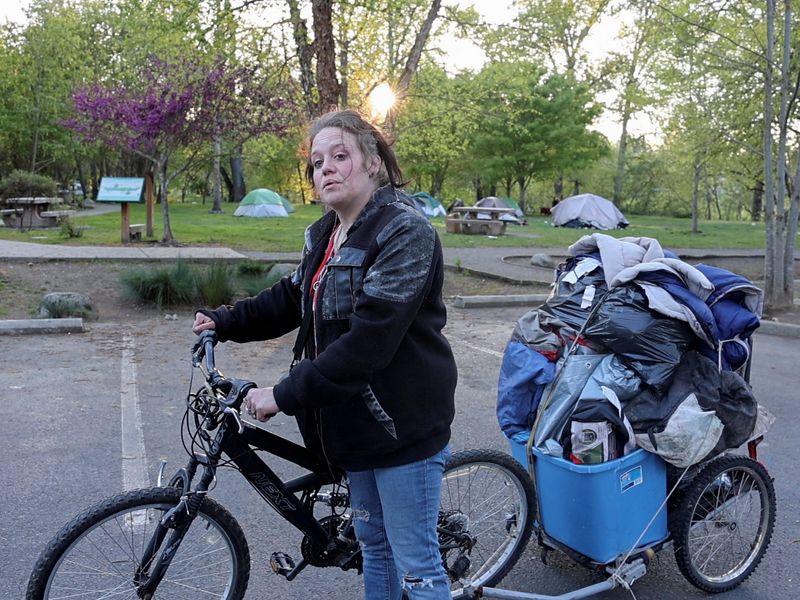By Deborah Bloom
GRANTS PASS, Oregon (Reuters) – On a sunny afternoon in a grassy park by the river, Amber Rockwell loaded a dusky, steel cart with a tent, suitcases, baggage, camping range and a plastic tin of licorice and tightened it all down with ratchet straps as she prepared to switch to the next park over.
Per week, she and the an total bunch of different of us residing outside in Grants Traipse, Oregon, need to pack up and substitute locations to assign some distance from being fined, arrested or stripped of their property by police.
“There’s no assign for us,” Rockwell says, sitting on the grass, taking a shatter from packing. “We’re made to feel like we shouldn’t even exist.”
This rural town of 39,000 on the Rogue River in southern Oregon’s wine nation is on the guts of a battle within the U.S. Supreme Court to resolve whether or no longer governments can legally ban of us from drowsing in public. Oral arguments are Monday, and the court docket’s eventual ruling could presumably perchance absorb nationwide implications for the style cities are allowed to assign a watch on homeless encampments.
“If we drag down this line, this road of criminalizing of us and banishing them, we’re going to wake up two or three years down the road, and we’re gonna absorb twice as many homeless of us as now we absorb,” said Ed Johnson, a apt aide authorized expert who helped file the 2018 lawsuit against Grants Traipse that the Supreme Court is reviewing.
Johnson, of the Oregon Law Center, says giving of us a prison file for homelessness makes it more difficult to secure jobs and housing to flee homelessness.
In briefings to the court docket, Johnson and his colleagues representing of us residing on the streets in Grants Traipse said Grants Traipse metropolis councilors’ comments in 2013 as they drafted a camping ban made it certain they absorb been attempting to expel homeless of us from town.
Grants Traipse is fighting a ruling by the San Francisco-based entirely Ninth U.S. Circuit Court of Appeals, which said town rules prohibiting camping on sidewalks, streets, parks or different public locations when shelter is unavailable violate the U.S. Structure’s Eighth Modification prohibition against “merciless and irregular” punishment.”
Johnson and his colleagues direct this ruling does no longer discontinuance Grants Traipse from limiting such conduct as littering or public urination.
Federal injunctions issued in 2020 and 2022 banned Grants Traipse from enforcing its anti-camping ordinances whereas the case goes by the courts. In the meantime, police are the narrate of a converse rules requiring a 72-hour take a look at prior to the metropolis can get rid of a campsite from public assign.
Grants Traipse has no public, low-barrier homeless shelters. An estimated 600 residents absorb been unhoused in 2019, per a degree-in-time rely.
In its arguments to the Supreme Court, Grants Traipse wrote: “There is nothing merciless or irregular a few civil perfect for violating traditional restrictions on public camping.”
Grants Traipse has been joined by Idaho’s authorized expert neatly-liked, Montana’s Department of Justice, rules enforcement groups in Washington converse, California Governor Gavin Newsom and others in asking the conservative-majority Supreme Court to give an explanation for or overturn the Ninth Circuit ruling, which they are saying has perplexed jurisdictions about what they would possibly be able to carry out to tackle unsafe and unsanitary encampments.
Groups equivalent to the Nationwide Homelessness Law Center absorb informed the court docket to verify the Ninth Circuit, asserting cities must soundless focal level on building housing to tackle homelessness.
Aaron Hisel, an authorized expert for Grants Traipse, said the premise of the Ninth Circuit ruling is “that except you are providing them shelter, you need to presumably presumably no longer punish them or birth the technique by writing a mark for them being within the parks.”
“Nonetheless now we absorb indubitably no longer in actuality severely instantaneous that except and unless the authorities affords you a reasonably helpful assign to drag to the bathroom, that then you absorb the upright to drag to the bathroom on public property,” Hisel said.
Below the converse rules in force now, these that carry out no longer switch along in Grants Traipse face $295 fines. On occasion, their property are confiscated or thrown away. Rockwell, 42, says she is generally no longer in a spot to relocate rapidly sufficient, and that she currently owes hundreds in fines she will be able to no longer pay.
“I don’t have not any money, I don’t absorb an earnings upright now,” she said. “It’s like milking a turnip.”
She said police threw away her property within the summer season of final twelve months, after she had dropped them off at one other park to drag abet for a 2d inch. Amongst her possessions, she says, used to be an urn storing the ashes of her stillborn son, whom she lost in 2020.
Grants Traipse Chief of Police Warren Hensman said that if officers take property from a park and carry out no longer know the proprietor, this is in a position to presumably presumably also fair additionally be stored for 90 days, “so a particular person has big time to claim their property.”
Hensman said his officers assign no longer need discarded an urn within the event that they had noticed it.
“Alternatively, if it used to be blended with dirty dresses, unsafe materials, drug paraphernalia and so on., it could perchance per chance presumably perchance presumably also absorb been missed,” he said.
Some in Grants Traipse direct they’re pissed off by the spread of homeless encampments. Joanie Jensen, a lifetime resident of Grants Traipse, said she no longer feels overjoyed taking part within the parks like she once did.
“My grandson is on the baseball group, and prior to each and every educate and game, they need to sweep your total outfield and the arena to assign certain that there’s no needles within the market or feces within the market,” Jensen said.

Ticket Lyon has been homeless in Grants Traipse, off and on, for the previous 20 years. He said he has witnessed the community changing into more hostile in direction of him and others on the streets.
“I’m in a position to know the assign they’re coming from,” Lyon, 65, said. “If I was a condo proprietor, I wouldn’t need me here, which is unhappy. Nonetheless I need to be some assign.”
FBS International substitute Bitcoin Stock






